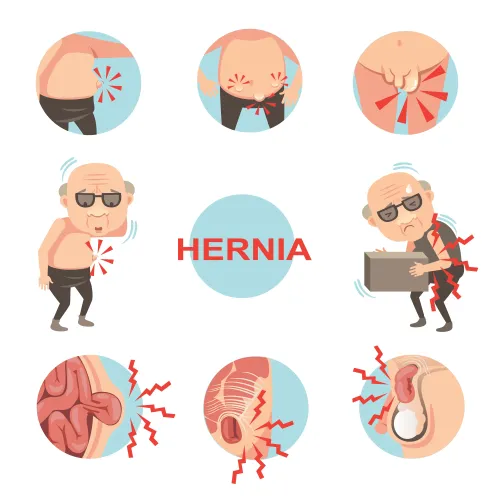Outpatient Facility Coding Alert
Case Study: Know When to Code Hernia Repair With Colon Resection

Learn the rules for separate services.
From a coder’s perspective, some of the more challenging surgical scenarios occur when the surgeon identifies an anomaly midway through a given procedure. For instance, it’s not uncommon for a surgeon to perform a hernia repair during a planned colon resection procedure.
In fact, it’s important to know the circumstances in which it’s appropriate to report a hernia repair in addition to a primary service such as a colon resection. As you’ll see, the challenge comes not only with the prospect of choosing the right set of surgical codes, but also making sure each code set is in accordance with National Correct Coding Initiative (NCCI, or CCI) edits.
Read on to get our expert’s advice on the following case:
Colon Resection Case
Surgeon performs laparoscopic partial colon resection with anastomosis for ischemic bowel. During the procedure, the surgeon identifies a right inguinal incarcerated hernia that is not reducible. The surgeon proceeds to laparoscopically resect the hernia sac and use mesh to repair the abdominal wall.
Choose Procedure Codes
Because the procedure is laparoscopic, you should report 44204 (Laparoscopy, surgical; colectomy, partial, with anastomosis) instead of 44140 (Colectomy, partial; with anastomosis) for the partial colectomy procedure.
Don’t miss: The correct code for the laparoscopic hernia repair is 49650 (Laparoscopy, surgical; repair initial inguinal hernia). As with the colectomy, you should not choose the open code for the hernia repair, such as 49507 (Repair initial inguinal hernia, age 5 years or older; incarcerated or strangulated).
Identify incidental: Many coders are hesitant to report a hernia repair in addition to another abdominal surgery because they’ve heard that the hernia repair is always “incidental” in these cases. But that’s not always true.
“In fact, you can separately report a hernia repair with another abdominal procedure code when the hernia site is not the same as the abdominal procedure, or the hernia repair is medically necessary for cases such as a strangulated hernia,” says Terri Brame Joy, MBA, CPC, COC, CGSC, CPC-I, director of operations with Encounter Telehealth in Omaha, Nebraska.
Check bundling: Doublecheck Medicare’s NCCI edits to see if you’re restricted from coding the two procedures together. In this case, CCI does not bundle 49650 and 44204. That means you won’t need to use a modifier to report these two codes together. However, the lack of a CCI bundling edit does not preclude the appropriate documentation of the separateness of the services.
Decide if Procedure Includes Mesh
This case states that the surgeon placed mesh as part of the hernia repair, but that doesn’t mean you should automatically add +49568 (Implantation of mesh or other prosthesis for open incisional or ventral hernia repair or mesh for closure of debridement for necrotizing soft tissue infection (List separately in addition to code for the incisional or ventral hernia repair)) to your bill. In fact, CPT® codes for laparoscopic hernia repair and many open hernia repair procedures other than ventral and incisional hernias include mesh placement, when performed. That’s because placing mesh is so common in those procedures that the codes include the mesh value in the established payment.
Caution: Some surgeons resist the idea that they can’t separately report the mesh placement and try to use +15777 (Implantation of biologic implant (eg, acellular dermal matrix) for soft tissue reinforcement (ie, breast, trunk) (List separately in addition to code for primary procedure)) instead of +49568. “You shouldn’t do that, because +15777 is only for use with other integumentary codes,” Joy says.
Related Articles
Outpatient Facility Coding Alert
- Modifiers:
Get Familiar With Modifier JW Use in OPPS Settings
See how guidelines differ in outpatient facility settings. When billing and reporting for the use [...] - Guidelines:
Adhere to Rules on Single-View Chest, Abdomen X-Ray Coding Cases
Learn how to navigate between parenthetical notes and other authoritative sources. Sometimes, even the most [...] - CPT® Coding:
Case Study: Know When to Code Hernia Repair With Colon Resection
Learn the rules for separate services. From a coder’s perspective, some of the more challenging [...] - You Be the Coder:
Check for Specific Criteria on Duplex Scan Reports
Question: On a scrotal ultrasound (US) with duplex scan, the provider documents in the duplex scan technique “duplex [...] - Reader Question:
Consider this C Code for MRI Breast With Contrast
Question: How should I report a magnetic resonance imaging (MRI) scan of the breast with [...] - Reader Question:
Report C9749 for Latera Implant in OPPS Setting
Question: I have a doctor that performed a “placement of bilateral Latera® implants for vestibular [...] - Reader Question:
Make These Considerations When Choosing Vulvar Excision Code
Question: The doctor removed a 10 cm vulvar mass from a patient. The mass was [...] - Reader Question:
Consider Modifier 79 for Unrelated Procedure Within Global Period
Question: The provider performed a debridement endoscopy (31237) at a one-month check-up visit following a [...]




